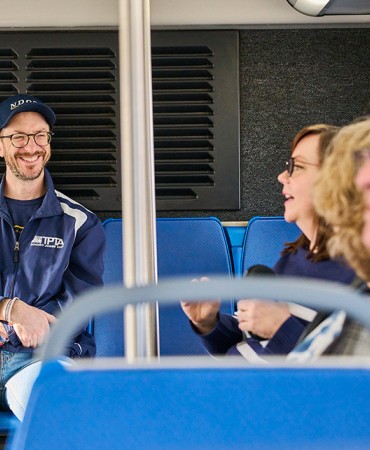In the 19 days since Mayor Freddie O’Connell announced his intention to pursue dedicated funding for transportation on the November ballot, the mayor and his administration have held the first meetings of the Community Advisory Committee, Technical Advisory Committee and one-on-one sessions Metro Council members. That work continues this week as both committees meet and conversations with Council continue.
Choose How You Move – An All-Access Pass to Sidewalks, Signals, Service, and Safety is building upon more than 70 plans and studies the city has conducted over the last decade. Mayor O’Connell campaigned on turning plans into action. Those studies leave no stone unturned as the mayor and Nashvillians plan to chip away at the city’s long-standing transportation issues.
Those 70 plans include:
- 26 community planning studies
- 9 transit plans
- 9 Transportation Plans
- 9 Regional studies
- 5 State Transportation Plans
- 11 other plans
In total, those 70 plans include more than 66,000 pieces of input from Nashvillians.
The latest data from Imagine Nashville suggest that Nashvillians overwhelmingly support investing in better transportation options. Three of every four (74%) Nashvillians strongly agree that investing in city-wide public transportation is an important priority for the future.
“This is the best opportunity we’ve ever had to build out sidewalks, to synchronize signals so you’re not waiting at red lights, and to connect neighborhoods via a better transit system that doesn’t have to stop downtown first," Mayor Freddie O'Connell said. "And this is a great chance to make Nashville more affordable by cutting unproductive time lost in traffic, by making affordable public transit options more accessible, and by ensuring that if you want to forego the $12,000 on average it costs Nashvillians per year to drive and maintain a car, you can."
The two committees have spent time so far exploring how to improve transportation efficiency on some of the city’s busiest corridors like Murfreesboro Pike, Dickerson Pike, Gallatin Pike, Nolensville Pike, and others. The committees discussed a wide range of opportunities and impacts from technology needs along the corridors to land use and affordable housing opportunities around transit centers.
The Community Advisory Committee all shared their transit stories – notes of how transportation impacts their quality of life in Nashville. The CAC posited that accessible transportation is a key to independence, belonging, understanding the city, and opportunity. Last week, the Community Advisory Committee also offered their thoughts on inclusion which were underscored by the results released this week by Imagine Nashville. It showed Nashvillians are driven by a unique and intense sense of belonging.
The Technical Advisory Committee shared their feedback on the opportunities for impacting all modes of travel along some of Nashville’s busiest corridors and used the input from the CAC to align possible short-term actions with the Transportation Improvement Program’s (TIP) long-term vision – one that ensures a program that is both practical and impactful for Nashvillians’ lives.
Passage of a transportation improvement program has the ability to supercharge the work Metro is already doing around the city.
Between his Capital Spending Plan and a budget surplus from Fiscal Year 2024, Mayor O’Connell and Metro are investing $17.5 million in new sidewalk construction and $24.5 million —our largest investment yet—in Vision Zero transportation safety initiatives that will keep cyclists and pedestrians safer around the city. Dedicated funding for transportation would dramatically speed up delivery of new sidewalks and safe infrastructure.

The plan would also allow Nashvillians to continue engagement in the future of their community. The timeline above shows the history of transportation planning in Nashville and the ways in which it would continue if a plan passes and is implemented.
Despite sustained investment in transportation infrastructure, sidewalks and technology, those projects have not kept pace with Nashville’s dramatic growth. Nashville cannot leverage county impact fees by state law, but passage of a transportation plan would allow Nashville to access federal funding for transportation projects at a rate that far exceeds anything in the city’s history.
"Transportation is a critical issue for college students, and many of them have to plan their entire day around transit times," Nashville State President Dr. Shanna L. Jackson said. "This is an important and overdue conversation we're having as a city. On behalf of our students and employees, along with the Nashville region, we appreciate the opportunity to add to the discussion."
Meetings with members of the Metro Council are ongoing as city leaders analyze the city’s transportation network needs on a granular, district level.
"I really appreciate how engaged Mayor O'Connell and his team have been with the council during this process. They have made a great effort to get feedback on the needs of each District,” said Metro Council Member Mike Cortese who represents District Four. “I am a big proponent of fiscal responsibility and am very appreciative of the mayor's approach on that front. He's been very intent on engaging stakeholders around the region and making sure we have options for a dedicated funding source. A dedicated funding source is huge because that will give us an opportunity to secure a larger investment from state and federal agencies."
As Mayor O’Connell said in his press conference announcing his intention to put a transportation improvement program on the November ballot, he and his administration are targeting an end of March or early April unveiling of a plan including the projects and anticipated funding available from revenue sources to support its implementation.
After that unveiling, Mayor O’Connell will launch an educational effort that emphasizes the continuation of community engagement via both public meetings around the city and an online survey that will allow Nashvillians to learn about and engage with the plan.
Nashvillians can also present their questions and feedback any time by emailing [email protected] or visiting Nashville.gov/transit.


